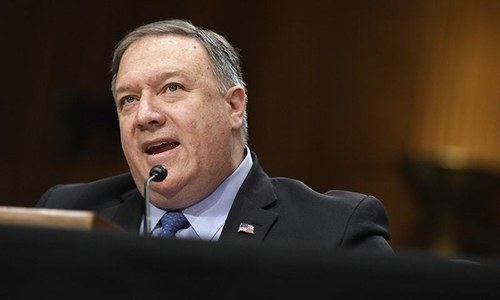US State Secretary Mike Pompeo on Monday announced a $1 billion cut in US aid to Afghanistan after he failed to convince Afghan President Ashraf Ghani and his political foe to end a feud that has helped jeopardise a US-led peace effort.
The United States also is prepared to cut 2021 assistance by the same amount and is conducting “a review of all of our programmes and projects to identify additional reductions, and reconsider our pledges to future donor conferences for Afghanistan,” Pompeo said in a statement.
Pompeo’s statement came as he flew home from a fruitless day-long effort in Kabul to end competing claims to the presidency by Ghani and Abdullah Abdullah and win their agreement to form “an inclusive government.”
The harshly worded announcement at the end of the mission he undertook — despite the spreading global coronavirus pandemic — underscored how badly stalled the US-led effort to end America’s longest war and decades of strife in Afghanistan has become.
The United States “deeply regrets” that Ghani and Abdullah were “unable to agree on an inclusive government,” said Pompeo, adding that “their failure has harmed US-Afghan relations and, sadly, dishonours those Afghan, Americans, and Coalition partners who have sacrificed their lives and treasure.”
“We are today announcing a responsible adjustment to our spending in Afghanistan and immediately reducing assistance by $1 billion this year. We are prepared to reduce by another $1 billion in 2021,” he said.
“We will also initiate a review of all of our programmes and projects to identify additional reductions.”
On his way back to Washington, Pompeo landed at a military base in Qatar for a 75-minute meeting with Taliban officials, including their top negotiator, Mullah Baradar Akhund.
Speaking to reporters after departing Qatar, Pompeo declined to detail how the $1 billion in aid cuts would be apportioned or whether he set a deadline for Ghani and Abdullah, who had served as the country’s chief executive, to settle their dispute.
But he indicated that the aid cut could be cancelled if they came to an agreement.
“We are hopeful, frankly, that they will get their act together and we won’t have to do it. But we’re prepared to do that,” he said.
In the meantime, he said, the United States would continue backing Afghan security forces while continuing a phased “conditions-based” troop withdrawal as specified in a deal signed with the Taliban in Doha on February 29.
He said that despite ongoing fighting, the Taliban largely have fulfilled a commitment to reduce violence and were working to form a team for intra-Afghan peace talks.
Pompeo’s mission came nearly a month after his last visit to Doha for the signing of the February 29 deal with Taliban. Ghani’s government was not a party to the agreement.
The agreement was to have been followed by the opening of negotiations on a political settlement to decades of strife between the insurgents and a delegation of Afghans that would include government officials.
But the process stalled over a Taliban demand for the release by Kabul of 5,000 prisoners and the feud between Ghani and Abdullah, both of whom claimed the presidency following a disputed September election marred by allegations of fraud.
While in Kabul, Pompeo met with Ghani and Abdullah, both separately and together.
Absent from the meetings was the chief US negotiator, Zalmay Khalilzad, an Afghan-born veteran diplomat. It was not immediately known why Khalilzad was not included.
A senior State Department official, speaking before the meetings ended, said the purpose of Pompeo’s visit was to try to mediate a solution between the two men.
“The fear is that unless this crisis gets resolved [...] soon, that could affect the peace process [...] our agreement with the Taliban could be put at risk,” the official said.
A spokesman for Ghani declined to comment, saying details of the meetings had not yet been released.
Omid Maisam, a spokesman for Abdullah, said that if there were more meetings a solution was “not impossible” and that they wanted a peaceful end to the crisis.
Skype call
Khalilzad, who has spent much of his time in Kabul since the deal was signed, made a plea to both sides last week to act quickly on the release of prisoners.
The Taliban and Afghan government spoke for more than two hours on prisoner releases on Sunday in a Skype call facilitated by the United States and Qatar, offering some hope of progress.
But domestic politics have been a complicating factor.
In February, Afghanistan’s Electoral Commission announced incumbent Ghani as the winner of the presidential election, but Abdullah said he and his allies had won and insisted that he would form a government.
Key sticking points in recent weeks between the two men have included Abdullah’s desire to retain the role of chief executive, which he held in the previous government, and that his camp be given more ministerial roles than Ghani was offering, according to the diplomat and an aide to Abdullah.















































